Will RV Fridge Run Off Battery While Driving? How to Keep Fridge Cold
One key question on the minds of many Rvers is: will RV fridge run off battery while driving? Yes, it is possible. If you don’t recharge your fridge’s battery, then it will be run off after 8 to 12 hours. However, fridge will take a lot of energy from the battery and you might notice that your battery life doesn’t last as long.
To help conserve power, unplug appliances like microwaves or ovens when they are not in use. You can also turn down the refrigerator temperature by 1 degree F every time you stop for an hour.
In today’s blog post, you will learn about the following:
- Types of RV refrigerators
- Some alternative power sources to run your RV refrigerator
- Different methods to reduce the power consumption of your RV fridge
- Precious tips to get the most out of a battery.
Table of Contents
Will RV Fridge Run Off Battery While Driving?
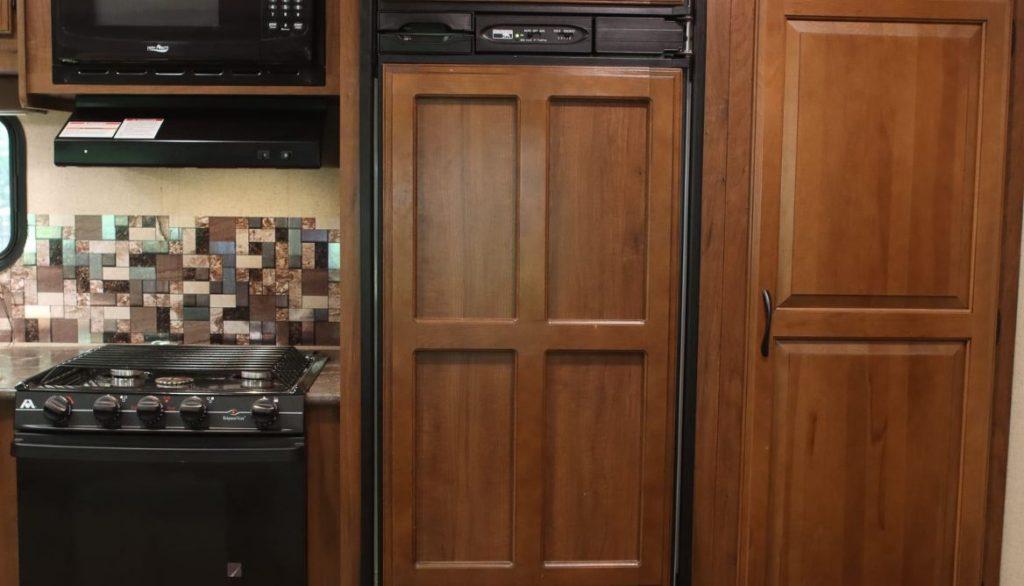
If you’re a full-time Rver, you’re probably wondering if your fridge will run off the battery while driving. The answer is yes. Your fridge will typically only run off the battery when it’s plugged in and run if on AC power. If you want to keep an RV fridge cold, there are a few things that you can do.
- First, make sure your RV refrigerator is well stocked before taking off on a trip.
- Second, bring plenty of ice for coolers or use an ice chest to keep items iced down as much as possible.
- Third, to RV fridge run stop every so often for a break and let everything cool down.
- Fourth, put away items that produce heat (like leftovers) as soon as possible after heating them, so they don’t add more heat to the inside of your RV.
- Fifth, turn off lights and appliances when not in use.
All these tips will help your RV fridges to save the amount of electricity while traveling. For a long road trip, try starting with a fully-stocked RV fridge before hitting the road.
How Long Will an RV Fridge Run Off a Battery?
The length of time an average RV fridge will run off a battery will depend on the size of the RV fridges, how many RV batteries you have, battery rating and how long you’re driving for.
Generally speaking, though, most RVs with a 12-volt system can run their fridge between eight and twelve hours, depending on these factors. If you want to find out how long your battery will last while driving with most RV refrigerators, it’s best to do some calculations.
First, calculate the amp hours of your battery power: divide the total amps by one hour. For example, if you have a 60-amp/hour deep cycle battery and your RV fridge run for five hours on one charge, then there are ten amp-hours remaining (60 ÷ 5).
The Top Three Types of RV Refrigerators and Their Power Sources
Let’s take a closer look at these three types of RV refrigerators and how they differ from each other in terms of both design and power source.
Compressor Refrigerator
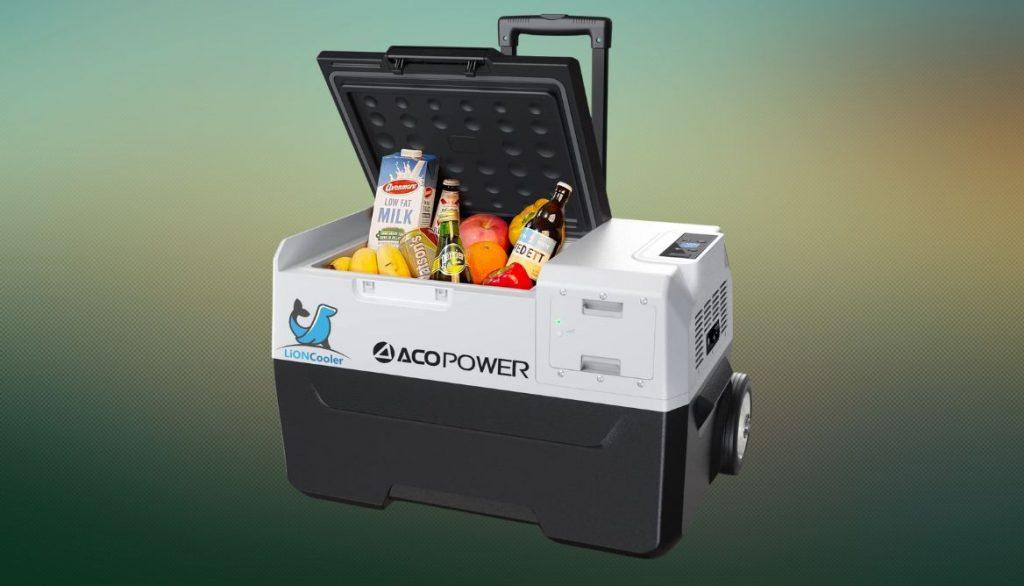
A compressor refrigerator is the most common type of refrigerator. The cooling system is a sealed system that removes heat from the inside using a compressor, condenser, evaporator, and refrigerant. This refrigerant then absorbs the heat from inside the RV fridge compartment and cools it to a temperature below freezing, thereby keeping food cold.
Most compressors are powered by either gasoline or propane gas delivered by a small propane tank stored outside the RV. However, some models have been designed to be powered by electricity only when plugged into an outlet at campgrounds with nearby ac power sources.
One example is the Coleman Power Smart Series 8, which uses less energy than standard units and can even operate on solar energy!
These RV refrigerators are often very noisy and can vibrate because of the inside working parts.
Absorption Refrigerator
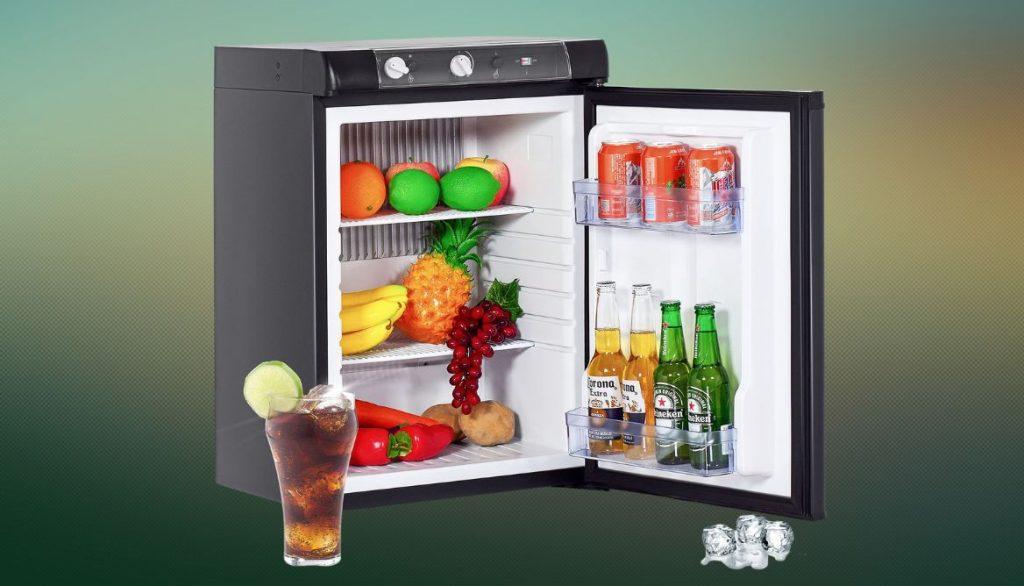
An absorption refrigerator is most commonly found in RVs, but there are other options for people who want a low-maintenance, energy-efficient refrigerator. Absorption refrigerators typically require very little energy because they get their cooling power from boiling water that passes over metal pipes. The water absorbs the heat from inside the RV fridge to cool down as it evaporates when it hits the pipes.
An advantage to this refrigerator is that you can use any heat source, such as solar panels or propane gas tanks, to power fridge. It’s also easy to clean and does not need filters or other maintenance types like other RV refrigerators.
One disadvantage of these absorption fridges is that the cooling process will slow if there isn’t a constant flow of hot water.
Residential Fridge
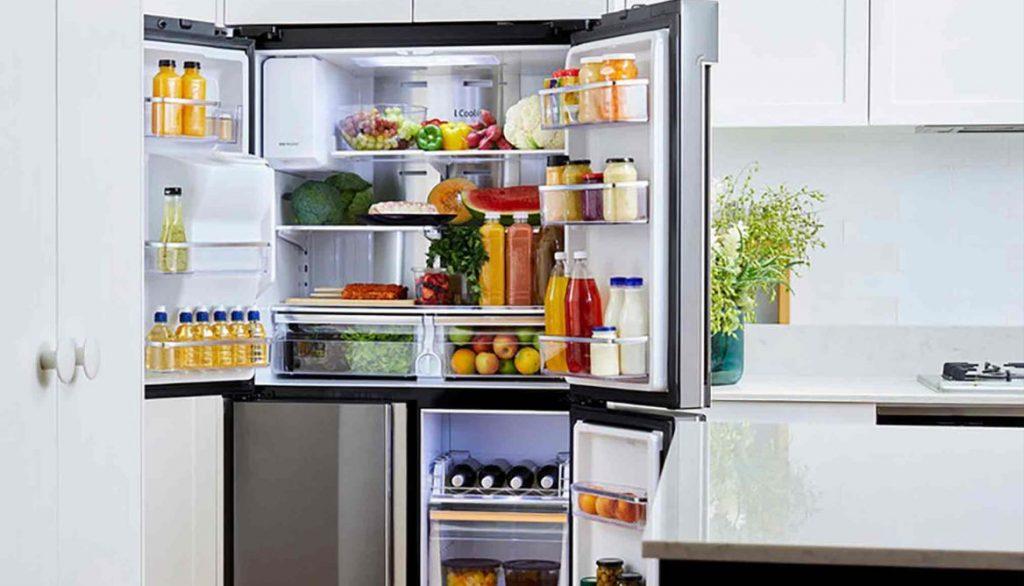
This is also a good choice if your home’s power is available to run a residential fridge. This RV fridge is more expensive than inverter fridges, but they will cool better since they have more space to store food. The downside is that you have to be near an electric outlet and gas station at all times.
They may also not cool because the compressor sometimes kicks on when you open the door, and sometimes it will only turn on if it senses too much heat from the inside. Also, it costs money to keep them running with propane gas instead of electricity.
They use propane gas as their ac power source, so you don’t need to be near an outlet for them to work. When the thermostat senses that the temperature inside the fridge is too high, it opens up the gas valve to allow more propane into the burner area of your fridge.
Once there is enough heat produced by this process, it will close off the gas valve and turn on your compressor to bring down that temperature again. Meanwhile, if you need to remove some items from the freezer or pull something out of the fridge like ice cream for dessert, you’ll notice that as soon as you open the door, some cool air rushes out.
That means your thermostat is opening up the electric fan and allowing cold air to be drawn in from outside. In other words, when you open a door or put food away or take something out of a drawer or cupboard—even while cooking—it can affect how much power your fridge uses.
Using a Generator to Power Your RV Fridge
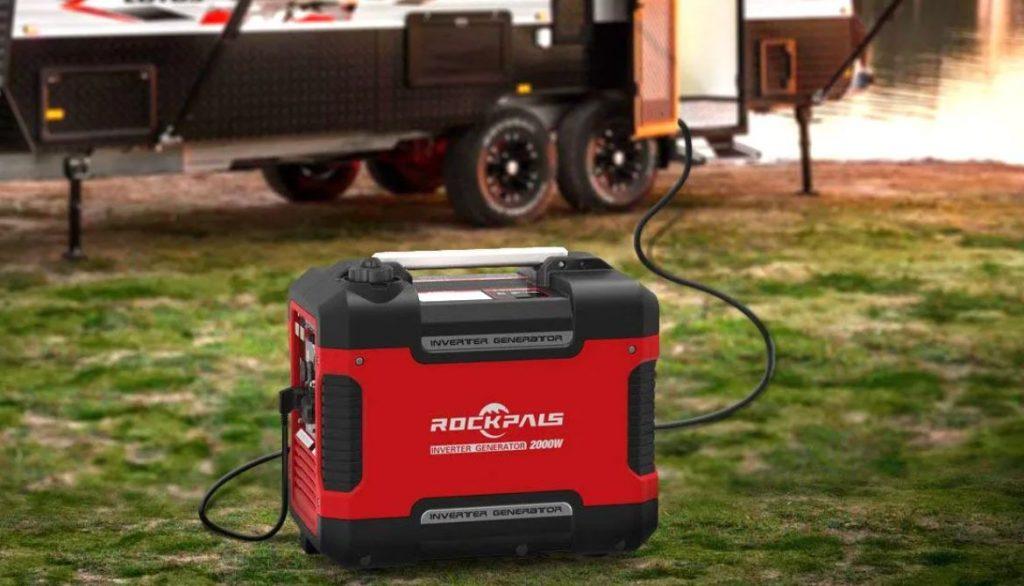
Worried about running out of battery power while driving? Investing in most RV generators might be a good idea. This will allow you to plug your fridge in and not worry about running out of RV batteries’ power when you need it the most.
Your generator gives power to your RV fridge by plugging the fridge into a power outlet at the back of the generator and using an extension cord that is plugged into a wall power outlet. This plugs in your fridge and powers it. The generator can be used for other purposes as well, such as charging your battery, powering lights or running air conditioning.
When you are done, remember to unplug the cord before you start driving again so there will be no accidents. Be careful not to overload the generator with too many items when it is on, because this can cause an overheat situation. If you plan to use the microwave oven and other appliances, find out how much watts they need from your generator.
It’s always a good idea to turn off all appliances when you finish cooking food in order to conserve fuel. You should also keep your home refrigerator turned off if you’re away for more than two weeks because it uses more energy than the refrigerator in your car.
It’s not safe to run gas-powered appliances inside a closed space like an RV, but if necessary, it’s important to ventilate and have fresh air coming through regularly.
The 5 Best Alternative Power Sources for Your RV Refrigerator
Let’s take a look at the 5 best alternative power sources for a fridge on an RV.
Solar Power
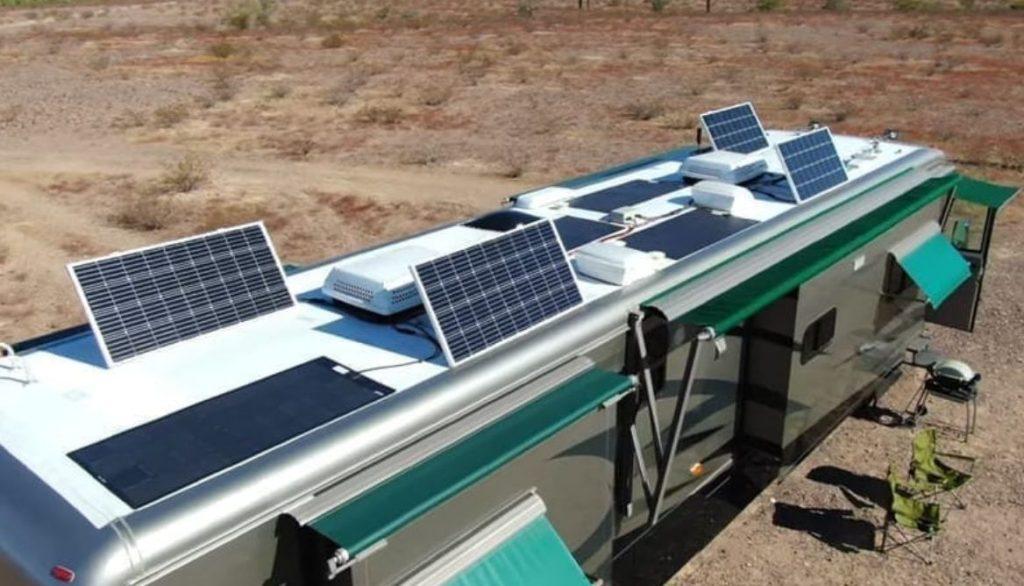
Solar power is the most sustainable and environmentally friendly of all the sources. It is a great choice because it can be used anywhere, even if you don’t have access to electricity. You only need a solar panel and battery storage system to start with solar power.
The RV battery system stores energy from the solar panels during the day and provides energy at night when the sun isn’t shining. Resultantly, an RV fridge cool faster on this system. Actually, a solar panel charges a battery or deep cycle marine battery. When that battery is fully charged, it switches off and the battery sends power to a charge controller which prevents overcharging.
The charge controller is then connected to an inverter that converts the direct current from the battery into alternating current for use in your household devices. Next, the AC goes to the converter, which changes the voltage levels to match those of your appliances so they can operate. The converter powers your AC and DC appliances like lights and fans.
Once you’ve plugged in the appliance to the converter, you are able to turn on the switch. The next step is converting power from AC (alternating current) to DC (direct current). You do this with a rectifier or regulator which produces single-phase AC for charging your batteries.
Wind Power
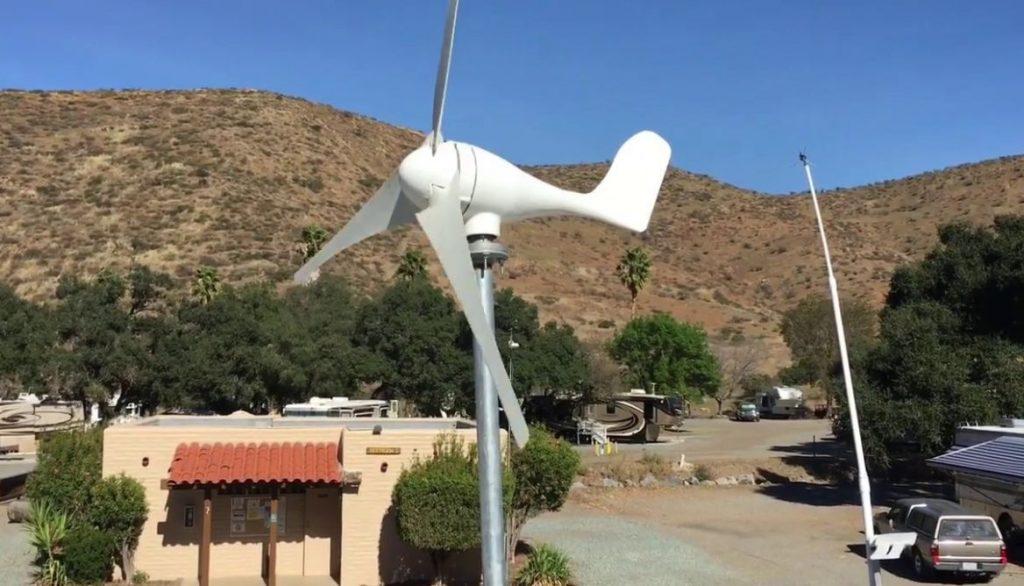
If you’re looking to save on energy costs, then go with wind power. It’s also the most environmentally friendly and least expensive renewable energy source. If you have the space, a wind turbine can power your refrigerator as a portable generator.
This type of system’s only downside is that it requires some maintenance. You’ll need to look after the blades from time to time and keep them free of debris.
Microhydro Power
Microhydro power uses the natural flow of a stream or river to create electricity. Microhydro power is only feasible in certain situations, but when it works, it can be an effective and low-cost way to generate ac power. Micro hydro systems sometimes use turbines powered by moving water instead of dams as generators.
Geothermal Power
Geothermal power harnesses the earth’s natural heat to create electricity through a process called geothermal energy conversion. It’s one of the cleanest, most sustainable sources of power in the world and has been used to power homes and businesses around the globe for decades.
It also provides an alternative energy source when traditional power grids are unavailable or unreliable. The only downside? Installation can be costly and labor-intensive.
Biomass Power
Biomass power is an other popular alternative energy source that utilizes wood, or other plant-based material, as its fuel. Biomass power can heat your home and run appliances such as a cold air conditioner, refrigerator, and water heater.
There are three biomass power plants: combustion engines, gas turbines and steam turbines. Combustion engines burn biomass to produce the heat needed to run the engine.
To use it in an RV, you would need a gas-fired appliance such as a refrigerator, stove or heater. It’s simple enough to hook up a gas tank that has been converted into a biogas generator.
In this setup, the engine will burn gasoline and then pump the exhaust into a small container that contains water and yeast. As they digest, they release methane which can be used for cooking or heating just like natural gas!
Different Ways to Reduce the Power Consumption of Your RV Fridge
Reducing the power consumption of your RV fridge can be done quite easily if you follow these ways.
Defrost Regularly
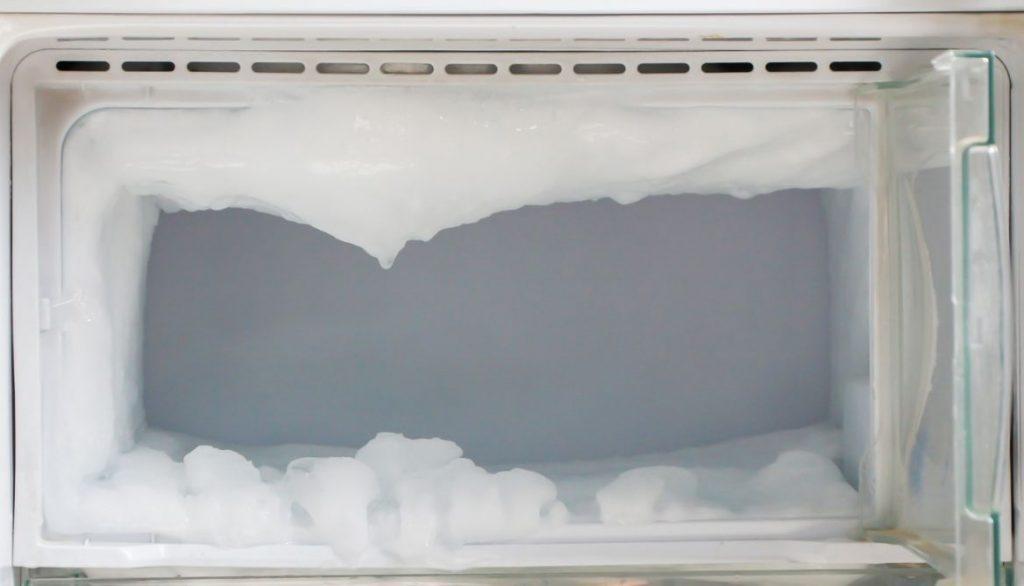
The most important thing you can do to keep your fridge running as efficiently as possible is to defrost regularly. This will help keep the coils from freezing, which wastes energy. The best way to do this is by turning off your fridge and letting it sit for a few hours (after you remove all food).
You can also use a vacuum cleaner or hair dryer on low heat to gently melt away any ice that may have built up in your fridge.
Keep It Clean

One way to reduce the power consumption of your fridge is by ensuring it is clean. Dust and dirt can build up on coils, which increases resistance and uses more power. Vacuum out vents and crevices in your fridge or air conditioner. The less dust buildup, the less energy is needed to cool or heat.
Clean refrigerator coils are important for saving power too! According to a study conducted at Colorado State University, vacuuming a fridge coil every two months can save 10% off the total electricity bill for cooling.
Use a Fridge Cover
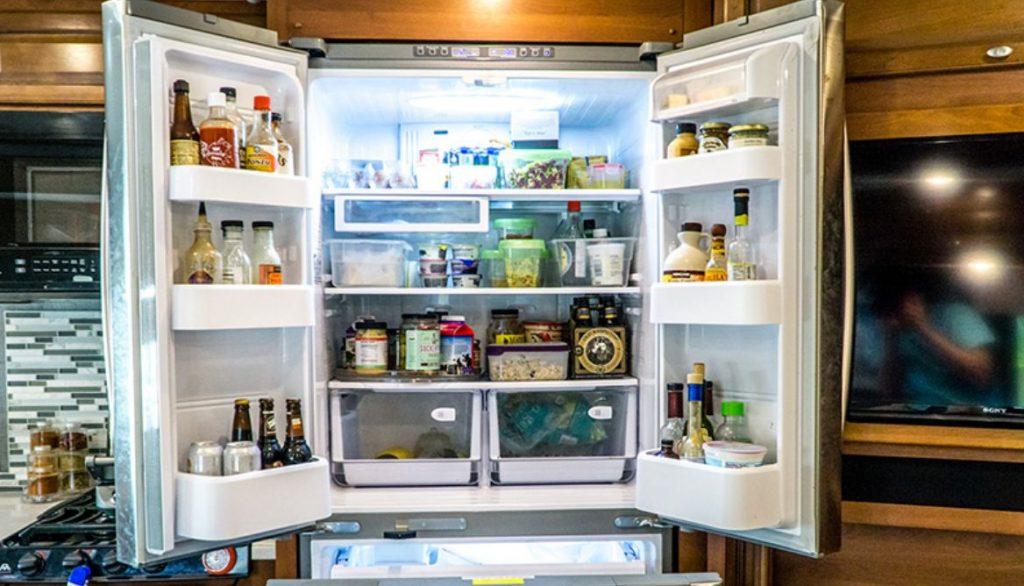
The next way is to reduce power consumption with an RV refrigerator cover. This simple addition will help keep your food cold without running the fridge all day. It also helps reduce condensation, which can lead to mold and mildew growth in your refrigerator. Plus, you save money on cooling costs!
Use LED Lights
LED lights save on your electric bill. LED lights use less energy and produce less heat than traditional incandescent bulbs. Try swapping out the bulb with an LED light for your RV fridge.
The most efficient LEDs provide bright white light similar to what you get from a regular bulb but consume 80% less energy. LEDs last up to 25 times longer than other bulbs, so you won’t have to replace them for years!
How Do I Get The Most Out Of My Battery?
We’re not going to lie. It can be frustrating when your RV fridge runs off the battery while driving and the power goes out. But with a few simple tricks, you’ll be able to get the most out of your rv house batteries.
For shorter trips, turn your refrigerator off while driving and only turn it on when you stop for food or need a cool drink. Make sure to give the fridge plenty of time (at least 10 minutes) before starting up again so that everything can settle back into place.
Leaving your RV fridge running off the RV battery is best for longer trips while driving in low-power consumption mode. Purchase an inverter that will allow you to plug in a small appliance like an electric kettle so you can still enjoy hot beverages during your drive.
Always switch your refrigerator from ‘on’ to ‘low’ as soon as you park. This way, the freezer doesn’t freeze up and causes more energy use when it starts running again.
Keeping your fridge plugged in overnight is another way to ensure that all the food stays fresh until morning because the temperature inside won’t fluctuate as much. However, if you unplug the fridge at night, ensure there is no reason it would not stay below 40°F (4°C).
Reasons Why an RV Refrigerator Works Better on Electric Rather Than Gas
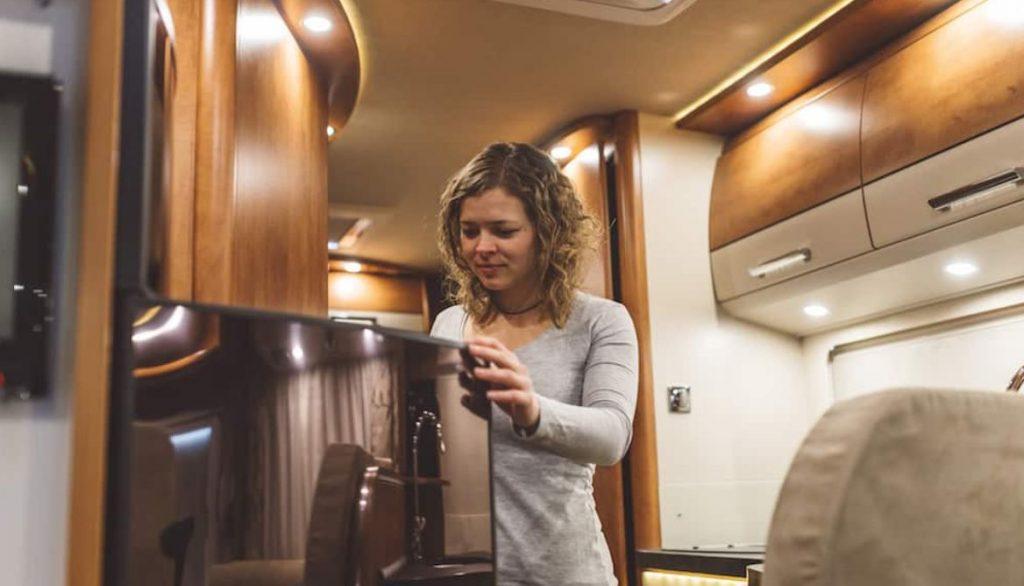
The following are reasons why an RV refrigerator works better on electricity than gas!
1) No flames = no risk of fire
A propane fridge runs on propane stored in tanks that must be refilled periodically. In addition, you have to worry about the possibility of leaks and the potential for fire on your RV trip. An electric refrigerator has no flames, so it’s not as risky if something goes wrong.
You don’t need to refill your refrigerator with lp gas because electricity provides all the necessary power. Finally, an electric power fridge will never produce a dangerous spark due to leakages or other malfunctions.
2) More energy-efficient
An RV refrigerator works better on electricity than gas because it’s more energy-efficient. Electric is much cheaper than lp gas and does not produce carbon dioxide, making it better for the environment.
Plus, with electricity, you don’t have to worry about refilling your tank when you’re out exploring. You can also ensure that your engine operates efficiently by running off electrical dc power.
3) Quieter
The next reason is that an electric refrigerator is quieter than a gas-powered one. Gas-powered refrigerators are loud, so if you’re living in your RV, you must be aware of how much noise your fridge will make.
The last thing you want to do is irritate your neighbors by running a noisy fridge all day. You don’t have this issue with an electric fridge because it’s less loud and annoying.
4) Lower emissions
Refrigerating your food in an electric refrigerator uses less energy than heating it with propane gas. This not only saves money but is also better for the environment. Additionally, if you run out of propane gas and electricity is available, you can still refrigerate your food without switching fuels.
For these reasons, most RVs have electric refrigerators installed. If you’re looking to replace your fridge, consider one that works best for your needs.
If all things are equal between the two options, go with the one with lower emissions—especially if the vehicle will be parked for extended periods.
5) Electric models are becoming more popular
Since the earliest days of the recreational vehicle industry, manufacturers have strived to make their products more efficient and better for the environment. This trend has only been amplified recently, with companies like Winnebago taking steps to decrease emissions and improve fuel efficiency. With this in mind, electric-powered appliances work best in an RV setting.
6) Gas units can be expensive
Burning fossil fuels to power these refrigerators may seem logical from a cost perspective. Still, once you factor in energy consumption and other related costs (like gasoline), gas-powered models can cost significantly more than models that rely on electricity.
5 Alternatives to Running Your RV Fridge While Driving
Consider these 5 alternatives to running your RV fridge to keep everyone safe!
Use an Insulated Cover
One simple solution is to purchase an insulated cover for your fridge. These covers will keep the food in the fridge cool and fresh by acting as a barrier between warm and cold inside air. The insulation will also protect your refrigerator from dirt or road grime that may enter through the vents, which can cause it to break down more quickly or not work.
The best thing about these types of covers is that they are inexpensive and easy to install on any vehicle with a 12-volt power outlet.
Drive During the Cooler Parts of the Day
Suppose you can’t avoid running your fridge while traveling, be sure to drive during the cooler parts of the day. When it’s hot outside, try to stay under 55 mph at any time. You’ll save gas, and you’ll also keep your fridge from overheating.
Even if you’re traveling in a colder climate, it might make sense to stay off the roads between 10:00 am and 2:00 pm when temperatures are at their hottest.
Use a Fan
One way to keep your refrigerators cold while driving is by using a fan. To do this, place the fan in front of your refrigerator and let it blow toward the door. If you need more ventilation, prop open a window, but make sure it’s at least five inches away from the fan so that it doesn’t interfere with how well it cools off the fridge.
The fan should suck in outside air and push out inside hot air. You can also put the fan on its side to help circulate all around your RV, including through doors, house batteries and windows.
Use Ice Blocks
An ice block is a great alternative for keeping your food fresh, especially if you’re not going to be driving very much. The trick with an ice block is to pre-cool the freezer section of your fridge before using it.
To do this, unplug your fridge from the power supply, take out the food, and put it into a cooler or other insulated containers.
Then, fill up at least half of the freezer with ice before plugging it into the fridge again. With an ice block, you can keep things cold for about six hours before needing a refill.
FAQs
How can you keep your fridge cool while driving?
Here are some tips on how to do so:
– Driving with the windows open
– Park in the shade
– Use a sunshade
– Don’t open the fridge too often
– Use ice packs
– Purchase the deep-cycle batteries that are designed for this purpose. These house batteries are also commonly used in golf carts and solar panels.
– Keep food and drinks refrigerated until they’re ready to be consumed – ice trays and coolers can help if necessary.
Should you turn off the fridge while driving?
If you’re running your fridge off battery power, you should turn it off during the time that you’re driving. This will help conserve energy and keep your RV batteries charged.
Will an RV Fridge Work Without the Battery?
The answer is yes, but it will take some finagling. Many people plug in their fridge when they’re not driving and then unplug it when they are ready to move again. This will work if you are plugged into shore power for at least 12 hours daily.
How Long Will My Battery Power the RV Fridge?
The length of time that your battery can power your RV refrigerator depends on the temperature outside, the size of your fridge, and how often you use it. However, the average battery life of an RV fridge is between 8 to 12 hours.
Can RV fridges be used without batteries?
An RV fridge can still be used without batteries, but it will only work while the vehicle runs. To use this type of fridge, you’ll need to plug the power cord into your vehicle’s cigarette lighter or 12V outlet. This will allow the fridge to run as long as your vehicle’s engine is on.
Will Drive On Uneven Roads Impact My Fridge’s Performance?
Driving on uneven roads can affect their performance. The shaking and vibration from uneven roads can cause the fridge’s compressor to switch on and off, which could lead to increased wear and tear on the unit over time. That said, your fridge should work fine if you’re careful not to drive too fast or over rough terrain.
Does an RV Fridge Need a Battery to Run On Propane?
An RV fridge does not need a battery to run on propane. The fridge can only run off propane when it’s not connected to shore power. If you want your refrigerator and appliances to work while in transit, you’ll need to invest in an inverter or install solar panels on your rig.
How Long Does an RV Fridge Take to Get Cold?
It’s difficult to say how long it will take for your fridge to cool down because so many factors could affect this. But in general, smaller and medium-sized refrigerators on RVtake 5 to 6 hours, while larger refrigerators take about 24 hours to cool down when running off 12 volts of DC power (battery).
Can I Replace My RV Refrigerator with a Standard Refrigerator?
A residential refrigerator can be used in an RV, but it may have different features or sizes than your standard fridge. The average residential fridge is about 20 cubic feet, while the average RV refrigerator is only ten cubic feet.
How Cold Should My RV Refrigerator Be?
It is generally recommended to keep your refrigerator temperature between 35-41°F. The lower the temperature, the less power will be needed to maintain this temperature.
Will an RV Fridge Run On Battery While Driving?
Yes – it just needs to be plugged in and turned on. But there are three questions you need to ask yourself before purchasing: how far do I drive, how much power my fridge draws, and what size house batteries do I want?
- One of the key considerations in determining whether or not your refrigerator will run off your 12-volt system when you’re driving is the time between recharges. The more often you drive and the longer each trip, the less time you’ll have to charge up again.
- The second thing to consider is the amount of electricity your refrigerator draws. If your refrigerator runs at 50 amps per hour (most common) and you only get 2 amp hours out of every charging cycle, you’ll need to recharge every two hours. If your fridge takes 30 amps per hour, you’ll only have to recharge once every 6 hours.To determine how many amp hours your battery has, divide the total amp hours by 10. So if your battery has 100 amp hours, it will last ten charges with a 50-amp refrigerator running at full load (5 charges with a 30-amp).
- The final consideration is the size of the RV batteries you plan on using for this setup.
Conclusion
A refrigerator in an RV can be one of the most useful appliances on board. Unfortunately, it runs off the 12-volt DC power system after 8 to 12 hours. Invest in large freezer blocks or insulated coolers with ice packs to keep your fridge cool. These will help keep your food and beverages chilled for up to ten hours without worrying about running out of gas.
If you do happen to end up without power, it’s just a matter of waiting until you get back home and plug it in again. Which alternative power source to keep your refrigerator in an RV do you like the most? Please tell us in the comment section. Thanks!

I`m a current Law Enforcement Officer working within the Counterterrorism Bureau in New York State. I have been Camping for over 20 years. My styles of camping include tent, car, truck, van, and RV travel trailer. I have a YouTube channel where I teach all types of camping with an entertaining method: https://youtube.com/@TheSmallsRVAdventures


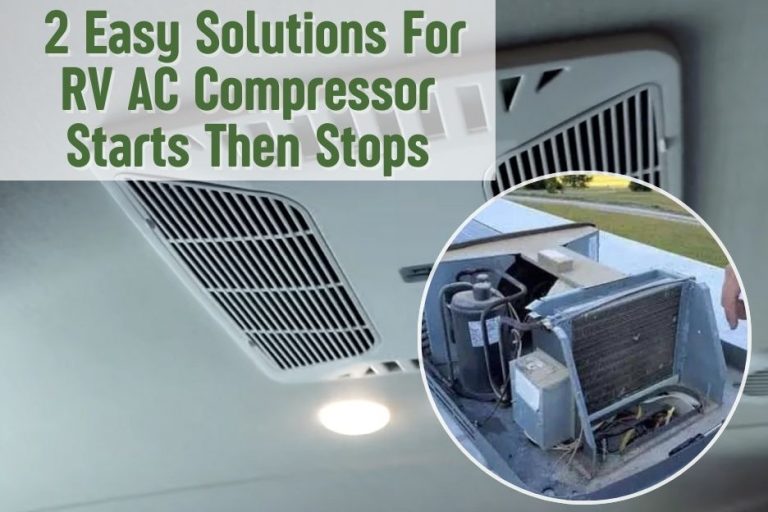


![Amazing RV Bathroom Storage & Decor Ideas [That Anyone Can Do]](https://camperlife.co/wp-content/uploads/2019/05/07RV-Storage-Ideas-Bathroom-.jpg)
